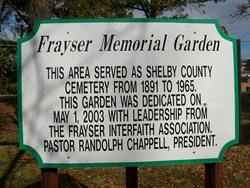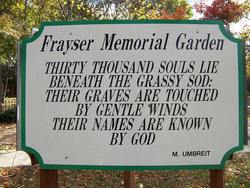30,000 Unknown
Shelby County Cemetery
(1891-1965, now defunct)
also known as “Potters Field”
There are no marked burial sites
Site of Frayser Memorial Garden,
on the grounds of Frayser Park,
next to Ed Rice Community Center,
2907 North Watkins, Memphis, TN 38127
Published in THE COMMERCIAL APPEAL
on November 4, 2008:
A Right Perspective — Burial Place Should Be Treated With Respect — The day you are born isn’t supposed to be the day you die. It’s tragic to bury your child of any age, to watch a child slip from this world to the next after a horrible illness or accident. But how do you say goodbye to a child never seen? You’ve carried the baby in your womb but never in your arms. The number 4045 was assigned to Patricia Steiger. Patricia was stillborn on Nov. 29, 1963. Her mother never got to say goodbye because she never got to say hello. Back then, doctors believed that whisking the infant away in the delivery room was best for the mother. News could be broken to the parents later.
Now we know better. Ultrasounds and other tests prepare us for crisis. We also know that naming the child, holding the child and saying goodbye are all part of the grieving process. Helen Steiger was denied that. Helen had just buried a sister and was still in shock. Finding out her baby girl was stillborn deepened her trauma. She already had two boys to rear. We didn’t know much about antidepressants back then. You sucked it up, slapped a fake smile on your face and got on with life. It was years later, 1998, [sic 1988] when Helen’s husband [Charles Edward Steiger] died, that she began to think about baby Patricia’s grave.
Where was it? Who tended it? Was there a marker? Could it be possible to exhume the casket and have Patricia buried next to the dad she never knew? Thus began Helen’s research into what happened to her daughter. And she learned more than she needed to know. In 1963, most stillborn babies were buried at the old Shelby County Cemetery on North Watkins with paupers and yellow fever victims. Worse yet, she learned that some of the babies were used, without consent of the parents, for medical research. A lady who has lived across the street from the site all of her life took Helen to the cemetery’s Infant Section. It is now a jogging track and picnic grounds at the Ed Rice Community Center. Helen was told that there were no identifying markers placed on the bodies of babies. They were simply buried. No ritual, no ceremony, no marker, no name. When Shelby County sold the land to the city of Memphis, many–but not all–of the adult remains were transferred to the Shelby County Cemetery on Ellis Road. There Helen learned Patricia’s number, but there was no way that her daughter’s tiny body would ever be located. I felt so touched by Helen’s story. She just wanted to find her baby’s grave and have it treated with dignity.
In 1999, City Councilman Brent Taylor and I arranged with Crone Monument to have a memorial marker placed at the Ed Rice Center where the babies were buried. We arranged a fitting memorial and my daughters released brightly colored balloons in memory of all of the babies. But Helen was not satisfied. She wanted more. It bothered her that a community center was built on a grave site. These people were paupers or babies or those who died of an epidemic. But they deserved no less than those at Elmwood.
The Frayser Interfaith Association helped Helen and together with donations from the city of Memphis, Shelby County government, and many individual church members, a memorial garden was erected at the community center in 2003. Jim Owen and Randy Langston donated the landscaping and now there is a lovely meditation area. Helen is still not satisfied. She wants a fence around the baby graves. The city of Memphis has refused to put up the fence because it will require increased maintenance of the site. There is an old adage frequently used by the government. “Just tell them no. Maybe they will go away.” Not Helen Steiger. I’ve known her for more than 10 years and she doesn’t go away.
Now in her 70s, she is a persistent but true Southern lady. She is dedicated to her cause, but not rude. She’s determined but soft-spoken. She wants that fence and will never give up hope. Come on, Memphis, let’s do the right thing. A few minutes more of maintenance seems like a small price to pay for all of the mishandling that Helen and the other mothers of stillborn babies during the 1960s endured. It’s about time we corrected a wrong. Perhaps a fence will symbolically surround the part of Helen’s heart that has been grieving


